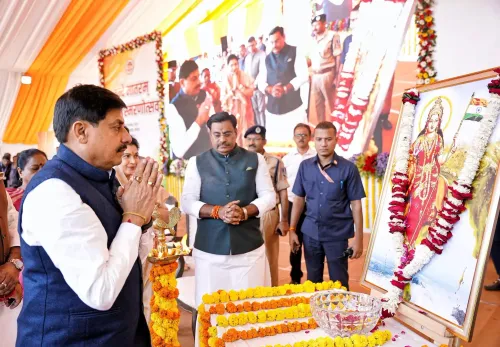How Can GCCs Utilize Government Schemes for Talent Acquisition?

Synopsis
Key Takeaways
- Leverage government schemes for talent acquisition.
- Utilize the National Career Services Portal for job matching.
- Engage in ongoing labour reforms for better workforce management.
- Expand career lounges in universities for talent pipelines.
- Focus on demographic strengths for sustained growth.
New Delhi, July 14 (NationPress) Vandana Gurnani, Secretary of the Ministry of Labour and Employment, urged Global Capability Centres (GCCs) on Monday to capitalize on available government programs for talent acquisition within the nation.
She encouraged the GCCs to tap into government initiatives such as the Employment Linked Incentive Scheme, which has immense potential for generating employment, alongside the National Career Services Portal, a holistic platform collaborating with leading companies to provide job matching services for talent identification.
Gurnani made these remarks at the GCC Business Summit hosted by the Confederation of Indian Industry (CII) in New Delhi.
Addressing the ongoing labour reforms, she highlighted the progress of the Labour Codes and the continuous cooperation with state governments to advance these reforms. She also described the expansion of career lounges in universities, which could act as crucial talent pipelines for the GCC sector, while mentioning India's international agreements regarding workforce mobility that can be effectively utilized for GCC operations.
Discussing India's core competitive strengths that have driven the remarkable growth of GCCs, Anuradha Thakur, Secretary of the Department of Economic Affairs at the Ministry of Finance, pointed out the robust physical and digital infrastructure, strategic initiatives through the Digital India campaign, simplified approval processes, a vast talent pool, and a solid regulatory framework developed over the past decade.
Thakur emphasized India's talent advantages, citing the country's substantial annual output of STEM graduates, a diverse workforce with considerable female participation, and a youthful median age. She asserted that these demographic characteristics provide fertile ground for sustained GCC growth and expansion.
Sanjay Bahadur, Member (Income Tax) of the Central Board of Direct Taxes, acknowledged the sector's impressive growth and its increasing contribution to India's GDP and employment. He pointed out the significant transformation of GCCs from basic outsourcing entities to intricate, cross-border operations engaged in high-value functions.
He further noted that modern GCCs are involved in advanced design innovation, backend services, and engineering contributions, creating complex value chains that present unique challenges in transfer pricing.
"The Central Government has initiated the development of a comprehensive national framework for GCCs to promote their growth and broaden their base," said K K Singh, Joint Secretary of the Ministry of Electronics and Information Technology.
Singh observed that most GCCs are concentrated in six major locations, including Bengaluru, Hyderabad, Delhi-NCR, Mumbai, Pune, and Chennai, while only a minor share is based in emerging cities. He recognized the challenges of expanding into tier-2 cities and emphasized the government's commitment to benchmark and replicate best practices from successful tier-1 hubs.
Gunjan Samtani, Chair of the CII Taskforce on GCCs and co-chairman of Goldman Sachs in India, co-presented a framework for the National GCC Policy, which would serve as a blueprint for expanding India's GCCs to approximately 5,000 units in the upcoming years.









